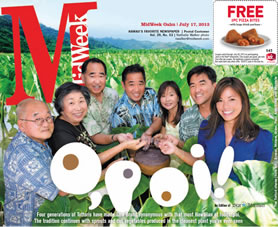O, Poi!
Four generations of Tottoris have made Taro Brand synonymous with that most Hawaiian of foods, poi. The tradition continues with sprouts and cut vegetables produced in the cleanest plant you’ve ever seen
This is a poilific poitrayal of an industrious and innovative family that poiduced and poifected an industry synonymous with Hawaii.
You’d be poifectly right to poisume that their story has something to do with poi. (Or that our spellcheck is lolo.)
mw-cover-071713-hpcfoods-4
This is the enchanting story of the Honolulu Poi Company, Hawaii’s foremost taro processor and creator of Taro Brand products. You’ve seen its familiar label in your grocery store. But do you know the players behind the poi and products?
Like taro, HPC Foods Ltd., as the company is known today, has deep roots in the Islands.
It was founded in 1946 by Japanese immigrant-farmer Kakuichi Tottori, who started a poi milling operation with three employees in Waipahu. Today, it is a food service titan with 180 employees and diversified product line.
What made this company take root and thrive while others sunk in the mud?
How did the Tottori family emerge a pioneer and standard-bearer of taro cultivation and poi production?
What is being done to spur growth and profitability for this niche product so it does not fade into obscurity?
We will explore these poivocative questions and poivide answers.
The Roots
Before venturing into poi production, first-generation farmer Kakuichi Tottori had a dairy in Kipapa and was one of the first to ship fresh pineapple to California.
Grandson Ernest Tottori, 79, chairman of HPC Foods, recalls, “My grandfather was a very adventurous man. He had a very good business sense. Right after the war, I don’t know what made that old man with the crazy idea to go into poi, but he started Honolulu Poi in summer 1946.
“When the war ended, my grandfather asked my father, James Ichiro Tottori, to run Honolulu Poi. Then, I took over in 1952 (at age 18),” Ernest Tottori recounts in an oral history.
At the time, there were 10 or 12 poi factories on Oahu. The two largest operations were Waiahole and Waimea Poi.
Ernest grimaces as he recalls the long hours and hard work demanded of him by his grandfather.
“Hard work? Ha!” he exclaims. “One New Year’s Day, I tell him it’s holiday. He tells me, ‘Oh, today half a day.’
“After my grandfather died, I paid off his debts, sold his farm and went into vegetable and taro farming at Waimanalo until 1954. I lost all my savings and turned to my father. At the same time, he wasn’t having a good time too,” Ernest relays. “So we teamed up and concentrated on Honolulu Poi Company. I took over general management in 1962.”
The family-run business continues today with a fourth-generation team. Youngest son Craig Tottori, 48, is president, supported by eldest brother Brian, 54, who supervises information technology, sister Ann Kinoshita, community relations, and brother Paul, 50, who oversees equipment and maintenance.
Ernest’s wife, Miriam, serves as executive vice president/corporate secretary. Craig’s wife, Michelle Tang, a 30-something dynamo in food service distribution and marketing, serves as general manager. She has previous experience at ‘Nalo Farms, Armstrong Produce and Coca Cola Bottling Co. of Hawaii.
The corporate ohana runs a dynamic yet, in many ways, unassuming enterprise based on Libby Street in Kalihi, where the Tottori kids grew up. What was once “home” is now a 9,000-square-foot central distribution building where poi and sprouts are produced and packaged. A short drive away, near Waiakamilo Road, is a 15,000-square-foot facility where fresh-cut fruit and vegetables are processed and packaged.
A fleet of 25 refrigerated trucks rolls out several times a week to deliver poi and other fresh food items to grocery stores, retail outlets, restaurants and institutions.
HPC is Hawaii’s largest poi manufacturer, producing more than 30,000 pounds a week, or more than 1 million pounds annually. Eighty percent of poi is sold through retail outlets, and 20 percent is sold for private luaus.
HPC uses the lehua variety of taro, richly cultivated in Hanalei, Kauai. Being farmers themselves at one time, the Tottoris for many years had a taro experimental growing farm in Haleiwa where they nurtured knowledge to help farmers. That exchange has resulted in higher crop yields to blunt taro shortages.
A key component of poi production is a Tottori-designed pressure cooker that can cook more than 6 tons of taro an hour. No more boiling taro in small batches for four to five hours.
Ernest was a welder by trade and did most of the equipment fabrication.
“He always pushes the philosophy of doing things yourself,” son Paul says. “Businesses in Hawaii are isolated, so when problems arise, you have to be self-reliant. Even today, the company has a maintenance department that is fully equipped with backup equipment and parts, and most of the renovations and expansions are done or overseen in-house.”







